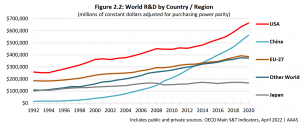And large natural language/multi-modal models like GPT/DALL-E would not be possible without Chinese image model ResNet which allowed to build such deep models in the first place by introducing the idea of residual/skip connections to effectively propagate gradients to deeper layers. This finally allowed to match the theory to practice because previous models all suffered from decaying performance with model growth despite the theory stating that deeper models should be at least as good as shallow models. It is the most cited DL research paper, far ahead of transformers - the basis of GPT and other modern NLP models (also uses residual connections btw).
The problem, as I said earlier, is that while China has plenty of AI researchers, it doesn't have the same energy or money in its AI start up scene, compared to the West. Or at least, it didn't until recently.
Companies like Baidu, Tencent, Alibaba are similar to Google, Facebook, and Microsoft in that they are highly hierarchical, political, and bureaucratic corporations, where a lot of nothing happens until a disruptive trend from a start-up forces them to either buy out the start-up, or be a "fast follower" in the technology. You can also throw in, in this group, South Korean companies like Samsung and Japanese companies like Sony.
That's why they were all beaten by Open AI, a company of merely 350 people. Microsoft at least had the foresight to invest in Open AI, but even then, why couldn't they build it themselves? Whey did Open AI and Stability AI beat them to market on ChatGPT, StableDiffusion, and Dall-E? It's the same reason Chinese companies like Baidu, Tencent, and Alibaba fail to be first to market. Corporations of that size just can't innovate at the same speed. Too much internal bureaucracy and corporate paralysis.
China needs more companies in the AI space like Byte Dance, DJI, and Mihoyo - unicorns that can move quickly and without the usual regulatory and bureaucratic bull **** that paralyze the big corporations. It must NOT become like Japan and South Korea where the economy is monopolized by such corporations.
Large corporations and consolidation are needed in sectors like chips manufacturing and heavy industries because of the massive over head costs and generally closed technology systems. But in AI and software, start ups rule. So what I'll be looking for from the Chinese government is the ability to distinguish between these two sectors. Xi is trying to bring more of the economy under state control; that could be a positive for advanced manufacturing industries, but it could be a negative for software and AI companies, which benefit from being less centralized.

